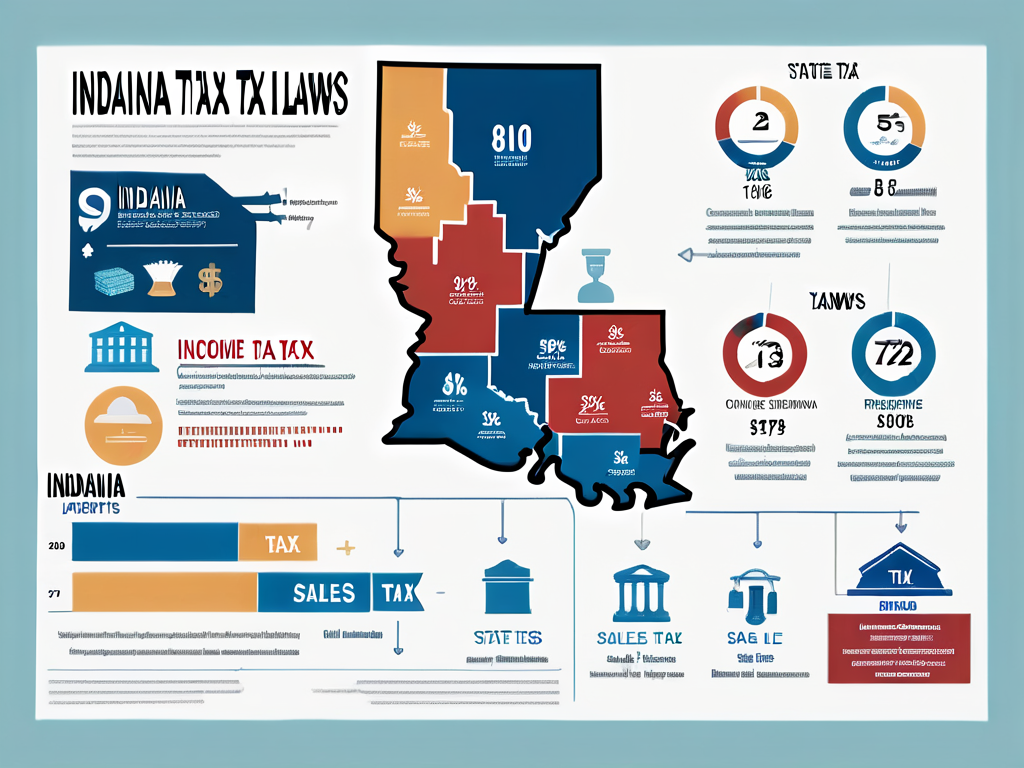Discover the comprehensive strategies and tips for effective tax planning in Huntertown, Indiana.
rEAD MORE
Tax planning is a critical aspect of financial management for individuals and businesses alike. It involves developing strategies to minimize tax liabilities while maximizing tax savings. In Huntertown, Indiana, understanding the local, state, and federal tax laws is essential for effective tax planning. This comprehensive guide will walk you through the basics of tax planning, explain how federal and state tax laws apply in Huntertown, and provide strategies to efficiently plan and prepare for tax season. So, let's dive in and explore the world of tax planning in Huntertown!
Tax planning encompasses various strategies aimed at minimizing the amount of tax you owe. By understanding the basics of tax planning, you can make informed decisions that will help you optimize your finances.

One crucial aspect of tax planning is considering the timing of your income and expenses. By strategically timing when you receive income or incur expenses, you can potentially lower your tax liability. For example, deferring income to a later year or accelerating deductions into the current year can help manage your tax burden effectively.
Tax planning is not just about ensuring compliance with tax laws; it’s about making the most of available deductions and credits to minimize your tax burden. Effective tax planning can free up funds to invest in your financial goals, whether that's saving for retirement or starting a business.
Another critical aspect of tax planning is understanding the impact of different investment vehicles on your tax situation. For instance, investing in tax-advantaged accounts like IRAs or 401(k)s can provide immediate tax benefits or tax-deferred growth, ultimately reducing your current tax bill.
Before we delve into the specifics, let's familiarize ourselves with some key terms in tax planning:
Understanding these key terms is essential for developing a comprehensive tax strategy that aligns with your financial objectives. By leveraging deductions, credits, and tax-efficient investment vehicles, you can proactively manage your tax obligations and maximize your financial resources for future growth and stability.
Understanding federal tax laws is crucial for effective tax planning in Huntertown, Indiana. Let's take a closer look at how these laws apply to individuals and businesses.

In addition to federal tax laws, it's important to consider how state and local tax regulations can also impact residents and businesses in Huntertown. Indiana, like many other states, has its own set of tax laws that individuals and businesses must adhere to. These laws can vary from income tax rates to sales tax rates, and understanding the interplay between federal, state, and local tax laws is essential for comprehensive tax planning strategies.
The Internal Revenue Service (IRS) is responsible for administering federal tax laws in the United States. In general, individuals are subject to federal income tax, while businesses are subject to various forms of federal taxes, such as income tax, payroll tax, and self-employment tax.
Moreover, federal tax laws are not static and can be subject to changes through new legislation or amendments to existing laws. It's crucial for individuals and businesses in Huntertown to stay informed about any updates to the tax code that may affect their financial obligations. Consulting with a tax professional can help navigate these complexities and ensure compliance with the latest regulations.
As a resident of Huntertown, Indiana, you need to be aware of specific federal tax laws that may impact you. For example, the Tax Cuts and Jobs Act introduced changes to individual tax rates, standard deductions, and various deductions and credits. Staying up to date with these laws is crucial for efficient tax planning.
Furthermore, understanding how federal tax laws apply to different sources of income, such as wages, investments, or self-employment earnings, is essential for accurate reporting and compliance. By knowing the nuances of these laws, Huntertown residents can optimize their tax strategies and minimize their tax liabilities within the boundaries of the law.
In addition to federal taxes, understanding state tax laws is essential for effective tax planning in Huntertown. Let's explore Indiana's tax structure and how it affects residents.

Indiana's tax laws are designed to fund various public services and infrastructure projects within the state. By complying with these laws, residents contribute to the development and maintenance of their communities.
Indiana imposes various types of taxes, including income tax, sales tax, property tax, and excise tax. The state's tax rates and rules differ from federal tax laws, so it's important to understand how they interact.
Income tax in Indiana is based on a flat rate system, which means that everyone pays the same percentage of their income regardless of their earnings. Sales tax, on the other hand, varies by county, with some areas charging additional local taxes on top of the state rate.
While Indiana's tax laws generally apply uniformly to all residents, specific tax credits, deductions, or exemptions may be available to residents of certain cities or counties, including Huntertown. Familiarizing yourself with these local nuances can help in optimizing your tax planning strategies.
Property tax in Indiana is determined based on the assessed value of real estate properties. This tax revenue is crucial for funding local schools, emergency services, and infrastructure improvements in Huntertown and other communities across the state.
Besides federal and state tax laws, it's vital to consider local tax regulations specific to Huntertown. Let's examine two essential areas: property taxes and sales tax.
Property taxes are levied on real estate within Huntertown. The local government assesses the value of your property and calculates the tax based on the assessed value. Understanding property tax rates and potential deductions can save you money during tax planning.
It's important to note that property taxes in Huntertown fund various local services such as schools, roads, and public safety. The assessed value of your property is determined by factors like location, size, and amenities. Huntertown residents can benefit from understanding how these factors influence their property tax bills and exploring any available tax relief programs.
Sales tax is imposed on most purchases made within Huntertown. The rate may vary depending on the items purchased. By considering potential sales tax exemptions and deductions, you can optimize your tax planning strategies.
Local businesses play a crucial role in collecting and remitting sales tax to the Huntertown government. Understanding sales tax laws and compliance requirements is essential for businesses to avoid penalties and maintain good standing with the local tax authorities. Additionally, consumers should be aware of any sales tax holidays or special exemptions that may apply to certain purchases, allowing them to make informed decisions and potentially save on taxes.
Now that we've covered the basics of tax planning and explained how federal, state, and local tax laws apply in Huntertown, let's explore some strategies to help you optimize your tax planning efforts.
When it comes to maximizing deductions and credits in Huntertown, it's crucial to delve into the specifics of local tax regulations. For residents of Huntertown, there may be unique deductions available that cater to the local community. For example, homeowners in certain neighborhoods might be eligible for property tax credits or energy-efficient home improvement deductions specific to Huntertown. By thoroughly researching these local opportunities and working with a tax professional well-versed in Huntertown tax laws, you can ensure you're not missing out on any potential savings.
Identifying eligible deductions and credits is essential for lowering your taxable income and tax liability. Examples of deductions include medical expenses, student loan interest, and mortgage interest. Tax credits, on the other hand, directly reduce the amount of tax you owe, such as the Child Tax Credit or the Lifetime Learning Credit. By staying informed and consulting a tax professional, you can ensure that you take advantage of all available tax-saving opportunities.
Moreover, staying organized throughout the year can make a significant difference in maximizing your deductions. Keeping detailed records of expenses, receipts, and charitable contributions can help you substantiate your claims and potentially qualify for more deductions. In Huntertown, where certain community initiatives or charitable organizations may offer tax incentives, maintaining thorough documentation can prove invaluable during tax season.
Retirement and estate planning can significantly impact your tax situation. Contributing to tax-advantaged retirement accounts (such as an Individual Retirement Account or 401(k)) can reduce your taxable income while building a nest egg for the future. Additionally, proper estate planning can minimize the estate tax burden for your beneficiaries. Understanding these strategies and consulting with a financial advisor or tax professional can help you make informed decisions.
For residents of Huntertown, exploring retirement planning options tailored to the local economy and industry landscape can offer additional benefits. Certain professions or sectors predominant in Huntertown may have retirement savings plans or investment opportunities that provide tax advantages specific to the area. By aligning your retirement planning with the nuances of Huntertown's financial landscape, you can potentially optimize your tax savings and long-term financial security.
While tax planning is achievable on your own, certain situations may warrant seeking professional tax help. Here are two factors to consider:
When it comes to taxes, the complexity of your financial situation plays a crucial role in determining whether you should hire a professional. For individuals who own a business, have significant investment income, or are going through major life changes such as marriage or divorce, seeking the expertise of a tax professional can be highly beneficial. These professionals can offer tailored advice that takes into account your unique circumstances, helping you navigate the intricate world of tax laws and regulations with ease.
If your tax situation is complex, such as owning a business, having significant investment income, or experiencing major life changes, hiring a tax professional is worth considering. They can provide expert advice tailored to your specific circumstances and ensure that you comply with all tax laws.
Furthermore, tax professionals can help you maximize deductions and credits, potentially saving you money in the long run. Their in-depth knowledge of the tax code allows them to identify opportunities for tax savings that you may have overlooked, ultimately optimizing your tax strategy and minimizing your tax liability.
When searching for a tax advisor in Huntertown, be sure to choose a qualified professional with expertise in tax planning and knowledge of local tax laws. Seek recommendations from trusted sources, read reviews, and conduct interviews to ensure a good fit for your needs.
It's essential to find a tax advisor who not only possesses the necessary qualifications and experience but also understands the specific tax requirements in Huntertown. By selecting a professional who is well-versed in local tax laws and regulations, you can ensure that your tax planning strategies are compliant and optimized for your geographical area. Additionally, a tax advisor with a strong understanding of the local tax landscape may be better equipped to identify region-specific tax incentives or credits that could benefit you financially.
As tax season approaches, proper preparation is key to a smooth filing process. Here are two essential steps to consider:
Before diving into the tax season frenzy, it's important to understand the various tax deadlines that may apply to you. In Huntertown, residents typically have until April 15th to file their federal tax returns. However, state tax deadlines may vary, so be sure to check the specific dates for Indiana to avoid any penalties for late filing.
Gather all relevant tax documents, such as W-2 forms, 1099 forms, and receipts for deductible expenses. Keep them organized and accessible to ensure accurate reporting on your tax return. Consider creating a designated folder or digital file to store all your tax-related paperwork throughout the year. This proactive approach can save you time and stress when it's time to file.
Moreover, it's advisable to review your previous year's tax return to identify any recurring deductions or credits you may be eligible for. This can help you maximize your tax savings and avoid overlooking potential benefits that could lower your tax liability.
When filing your taxes in Huntertown, you have several options: filing electronically through tax software, hiring a tax professional to prepare and file on your behalf, or completing paper forms manually. Choose the method that best suits your needs and always double-check your return for accuracy. Keep in mind that electronic filing not only speeds up the processing of your return but also reduces the risk of errors that can delay any potential refunds.
Additionally, if you anticipate any complexities in your tax situation, such as investment income, self-employment earnings, or rental properties, seeking the guidance of a tax professional may provide peace of mind and ensure compliance with all tax laws. They can offer valuable insights into potential deductions and credits specific to your circumstances, potentially optimizing your tax outcome.
Now that you have a solid understanding of tax planning, it's important to be aware of common mistakes to avoid:
Tax laws can be complex and subject to change. Keep yourself informed by staying up to date with federal, state, and local tax laws. Ignorance or misinterpretation of tax laws can result in errors and potential penalties.
Tax planning is a year-round effort. Waiting until the last minute to think about your taxes can lead to missed opportunities for savings. Maintain organized records and make tax planning an ongoing priority.
It's also crucial to understand the different tax deductions and credits available to you. By taking advantage of these tax breaks, you can potentially lower your taxable income and reduce the amount of taxes you owe. Some common deductions include mortgage interest, charitable contributions, and medical expenses.
Furthermore, consider exploring retirement account options such as IRAs and 401(k)s. Contributing to these accounts not only helps you save for the future but can also provide tax benefits in the present. By strategically allocating your funds into retirement accounts, you can lower your taxable income and grow your savings tax-deferred.
By following the ultimate guide to tax planning in Huntertown, Indiana, you can navigate the complexities of tax laws and develop effective strategies to optimize your financial well-being. Consult with professionals as needed, stay informed about tax law changes, and make tax planning an integral part of your financial management. With careful planning and informed decision-making, you can minimize your tax liabilities while maximizing your financial goals. Happy tax planning!
Copyright © 2025 Vincere Tax| All Rights Reserved
Privacy Policy